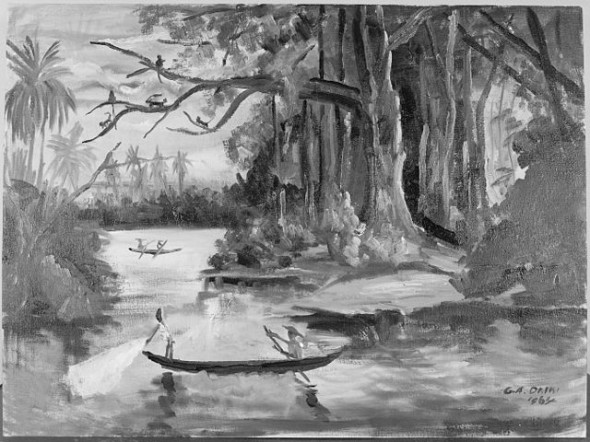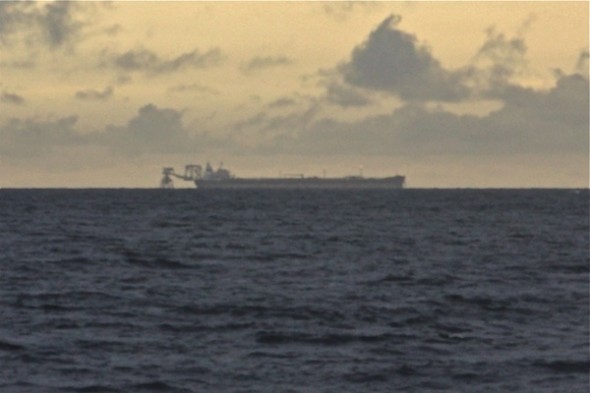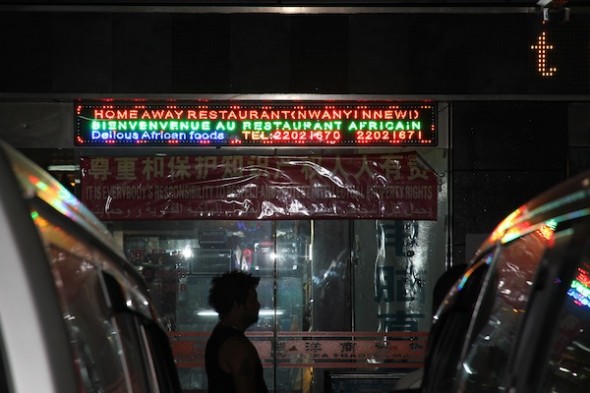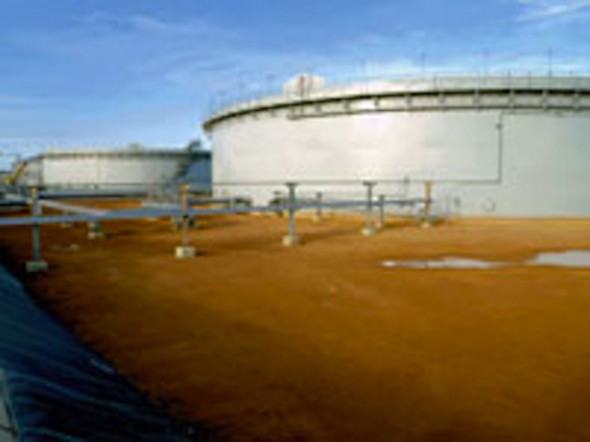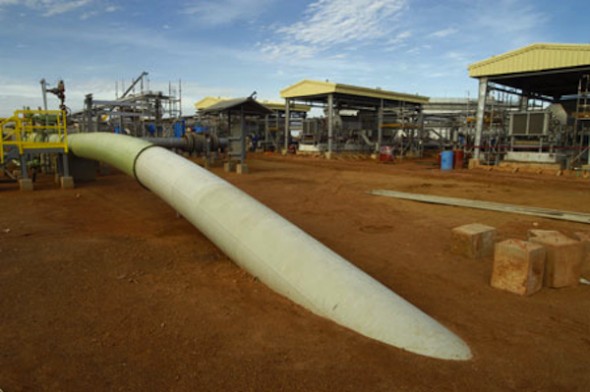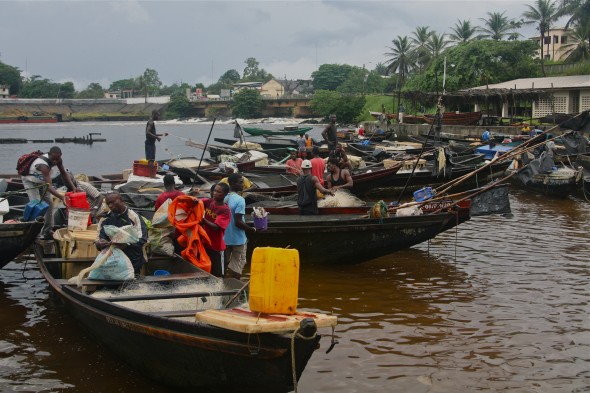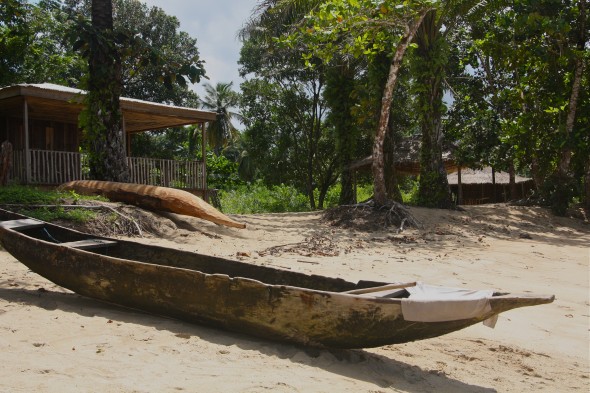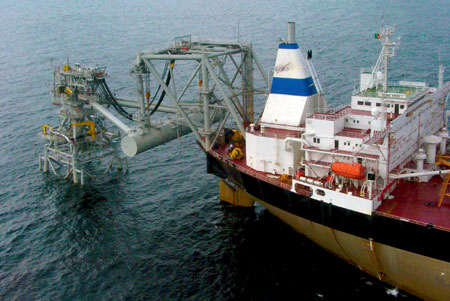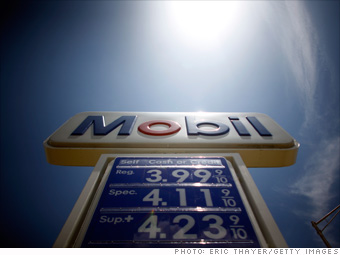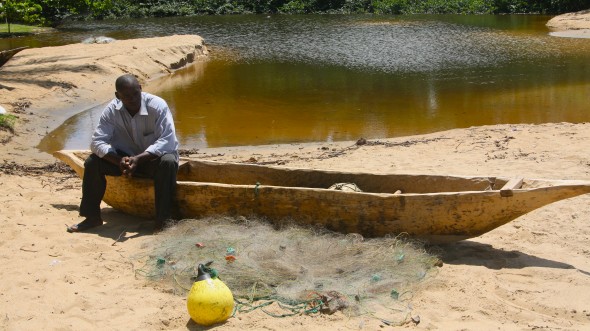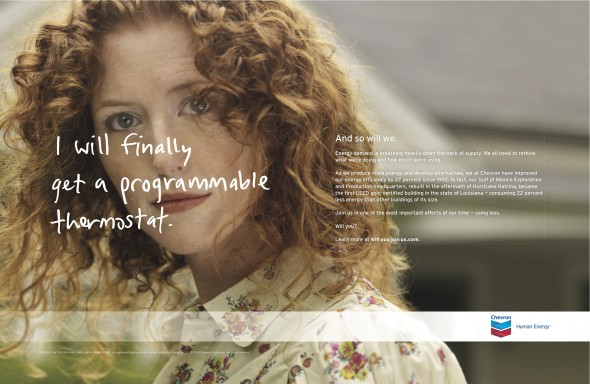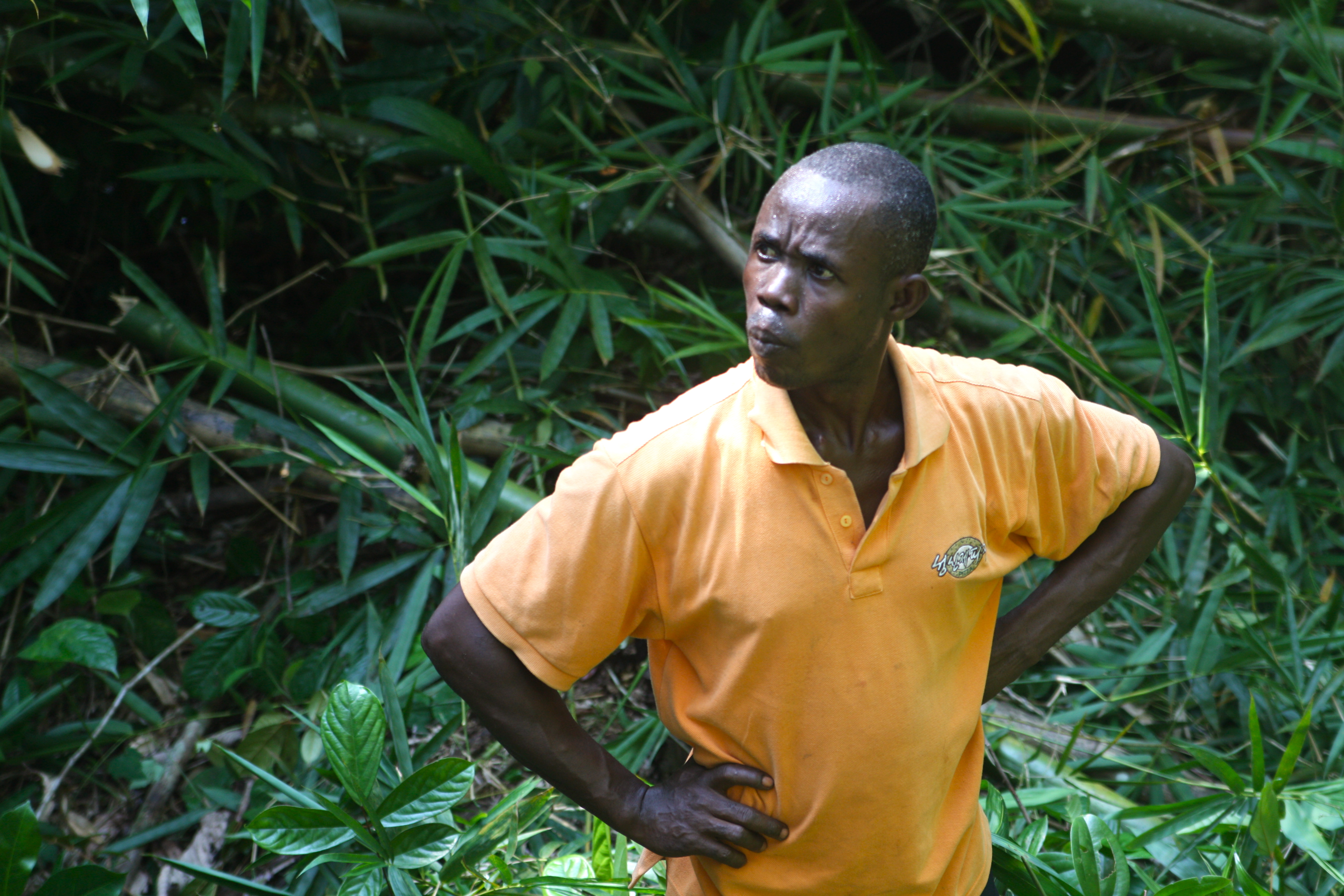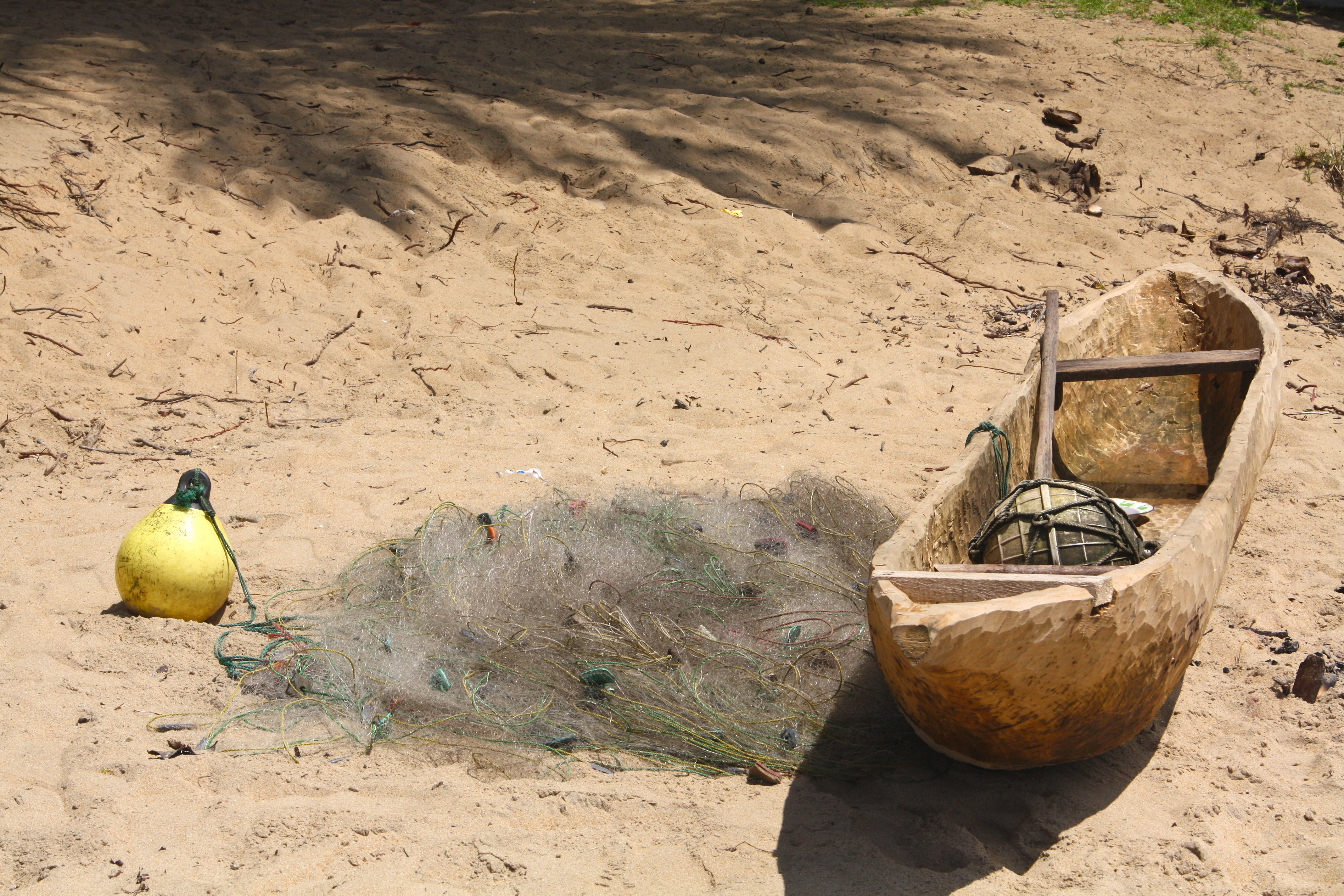Chad’s oil: 10 year anniversary, nothing much to celebrate
It was on October 10th 2003 that Exxon Mobil and its partners officially inaugurated the Chad-Cameroon Oil Project. The press release marking the event was positively jubilant:
Addressing inauguration attendees, Morris Foster, president of ExxonMobil Development Company, said, “It is with great pride that I am here today to celebrate this tremendous accomplishment with everyone who has been involved in the Project. I want to personally thank President Deby and President Biya for their support along with important contributions of our co-venturers, Petronas and ChevronTexaco, and the World Bank Group for their commitment to this Project.
“Today we celebrate not only what was achieved during the construction but Esso, as operator, also celebrates the manner in which it has been accomplished,” Mr. Foster added. “We maintained our long-term focus on this project over 27 years of effort and changes in the consortium, increased the known oil reserves to commercial levels and helped turn a vision in 1976 into a reality. We believe this project will help prepare a brighter future for the citizens of Chad and Cameroon, and I am proud we are part of it.”
ExxonMobil, Shell, abuse and accountability
Mother Jones magazine has published, Did ExxonMobil Pay Torturers?, by Ian T. Shearn and Laird Townsend. The article details ExxonMobil’s possible involvement in human rights abuses in Indonesia and the victims’ decade-long struggle for justice.
“In June 2001,” the authors write, “John Doe III and 10 other civilian neighbors of ExxonMobil’s Arun natural gas facility filed a lawsuit against ExxonMobil in federal district court in Washington, DC. In John Doe v. ExxonMobil, the villagers charge the company with complicity in torture, arbitrary detention, and extrajudicial killings allegedly committed by Indonesian soldiers it hired to provide security.”
Oil spill offshore Nigeria worsening
SweetCrude reports that an ExxonMobil spill off the coast of Nigeria is worsening:
THE oil spill near ExxonMobil oilfield off the coast of Ibeno, Akwa Ibom State, southeast of Nigeria has spread along the shore for about 15 miles, and locals said it was killing fish they depend on to live.
Mobil Producing Nigeria, a joint venture between ExxonMobil and the state oil firm, said this month it was helping clean up an oil spill near its Ibeno field in Akwa Ibom state, though it did not know the source of the oil.
Cameroon hires company for oil spill clean-up, nine years behind schedule
You learn all kinds of crazy things reading the news. Cameroon Online published a story from APA news on August 19th, Une firme francaise va faire de la depollution maritime au Cameroun.
According to the story, Cameroon’s Societe Nationale des Hydrocarbures (SNH, the state oil company) has signed an agreement with French company, Le Floch Dépollution, for maritime oil spill clean-up operations.
Better late than never.
China, Nigeria and oil
Oil’s curse sends millions abroad in search of opportunity.
I’m back from China where I spent a few weeks working with the Nigerian community of Guangzhou on a project that has nothing to do with oil. That said, oil came up in virtually every conversation I had with Nigerians: The oil money that has corrupted the country, killing off business enterprise and agriculture. The oil pollution that has ravaged the Niger Delta for decades, ruining countless lives and the environment.
Many people asked me when I would go to Nigeria to report on that country’s oil curse. Over and over again, people asked me why the BP Deepwater Horizon disaster was covered by the media and — most importantly — cleaned up, while the Niger Delta disaster is left untouched and rarely gets mentioned in the international press.
Thoughts on ExxonMobil from China
I’m writing from Guangzhou, China, where I’m spending a few days working with the city’s Nigerian community. This work is not directly related to oil, although it’s not hard to make the connection. The corrosive impact of oil on the Nigerian economy (and society more generally) comes up again and again in conversations.
How many Nigerians have left their country because of its oil-generated “wealth”?
ExxonMobil’s dark empire
Steve Coll’s new book, Private Empire: ExxonMobil and American Power, is out and Democracy Now! has an extensive interview with him about Exxon’s dirty dealings from Indonesia to Nigeria and Chad.
Here’s an excerpt from the interview about ExxonMobil’s involvement in Chad:
Chad, of course, is a benighted country—today about 181st out of 187 countries in the human development index kept by the United Nations indicating quality of life. Life expectancy there is still below 50 years. But it has oil. And its authoritarian leader, to put it politely, Idriss Déby, decided to try to develop this oil, even though Chad was landlocked and didn’t have any national capacity to build an oil company, so they invited in Exxon and the World Bank. And they undertook this experiment, really without precedent, to require Chad to use its oil profits for the good of its people, spending on education, health and social development. And Exxon was a participant in this and described it as potentially a new model to address the resource curse in Africa, where countries that are rich in minerals but try to develop through the sale of those minerals often fail to serve their people very well. So this was a kind of a grand experiment. And it failed.
New pipeline safety report: Much room for improvement
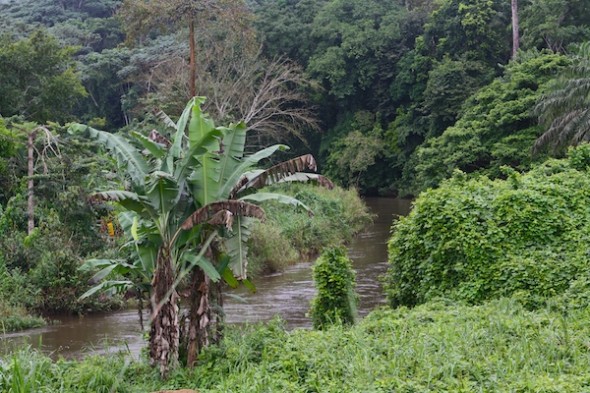
Vulnerable to dangerous spills: The Chad-Cameroon pipeline crosses a number of rivers in remote, densely forested areas. Photo: Christiane Badgley
The New York Times Green Blog reports on a new pipeline study from the U.S. National Wildlife Federation (NWF).
Times reporter Dan Frosch writes that the NWF study, “asserts that federal laws regulating oil pipelines are inadequate in several crucial areas and that local regulations do not provide sufficient protection against safety and environmental risks.”
The NWF report was prompted by a July 2010 rupture of an Enbridge Energy Partners oil pipeline in Michigan that spilled some 1 million gallons of crude oil, contaminating more than 30 miles of a major Lake Michigan truibutary. According to NWF, the incident, “raised health concerns and killed wildlife. It also exposed numerous weaknesses in pipeline regulation.
Chad: Oil money, hungry people
Today Chad is facing a food crisis. An alarming number of people are hungry and sick in the northern part of the country.
The Guardian ran a story recently on the dire situation, Chad’s malnourished children offer stark illustration of Sahel food crisis.
Strangely, the article doesn’t mention the fact that Chad is an oil producing nation with sizeable oil revenues.
Chad earned more than US$2 billion in 2011 from the ExxonMobil Doba fields project. As I’ve reported, by 2008 Chad had already earned more than US$8 billion from the Chad-Cameroon oil development project. China is also drilling and refining oil in Chad. I don’t have figures for Chad’s earnings from Chinese drilling, and the Chinese-built and 60% owned refinery has been mired in conflict since it opened in June 2011. But the point remains: Chad has oil revenues, but apparently there’s not enough money to deal with the food crisis.
Pipeline oversight: Are independent monitoring panels effective, truly independent?
Over the past few weeks I’ve been scrutinizing documents on the safety and oversight of the Chad-Cameroon pipeline. As I wrote in an initial blog post, the ruptured ExxonMobil pipeline and subsequent oil spill in the Yellowstone River in Montana got me thinking about similarities with the ExxonMobil pipeline that crosses no fewer than 17 major rivers in Cameroon. I then wrote a follow-up post on pipeline oversight (or lack of).
So I was thrilled when I found out that Oxfam America was preparing a new report on the monitoring of controversial oil and gas projects featuring the Chad-Cameroon pipeline as one of its case studies. The report, Watching the Watchdogs, was launched yesterday in Washington, D.C. Among the speakers at yesterday’s panel were Jacques Gérin and Nadji Nelambaye who were both involved with monitoring the Chad-Cameroon pipeline.
Pipelines: More on the Montana – Cameroon connection
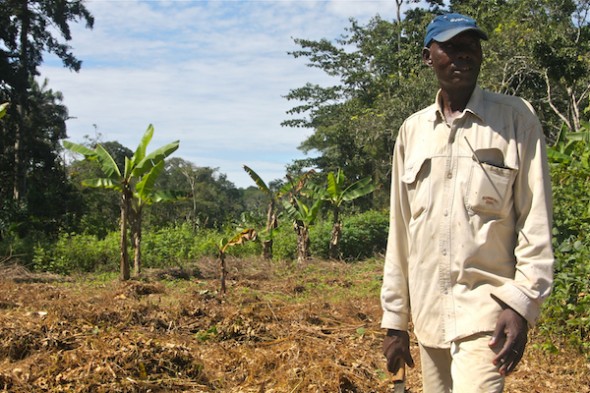
Farmer Jean Edzoa standing on the pipeline easement near Yaounde. He and other farmers in the area complain that "nothing grows" around the pipeline. Photo by Christiane Badgley
I recently wrote about ExxonMobil’s July oil spill in Montana and what lessons the Yellowstone River accident may have for Cameroon.
The same day an article in The New York Times, Pipeline Spills Put Safeguards Under Scrutiny, analyzed the regulation and oversight of the 167,000-mile system of hazardous liquid pipelines crisscrossing the United States.
The article describes a federal monitoring agency that is, “chronically short of inspectors and lacks the resources needed to hire more, leaving too much of the regulatory control in the hands of pipeline operators themselves…”
Exxon spill in Montana: lessons for Cameroon?
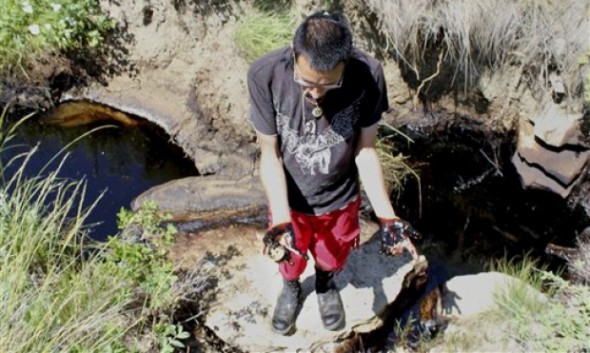
A member of the Blackfeet Tribe takes 'water' samples for a community hospital water lab near Cut Bank Creek, Mont. Photo: Destini Vaile/AP
On July 1 an ExxonMobil underground pipeline ruptured near Laurel, Montana, spilling tens of thousands of gallons of crude oil into the Yellowstone River. Montana is a long way from Africa, but this spill has me thinking about the Chad-Cameroon oil pipeline, another ExxonMobil underground pipeline that passes below several rivers where water pressure and erosion are real concerns.
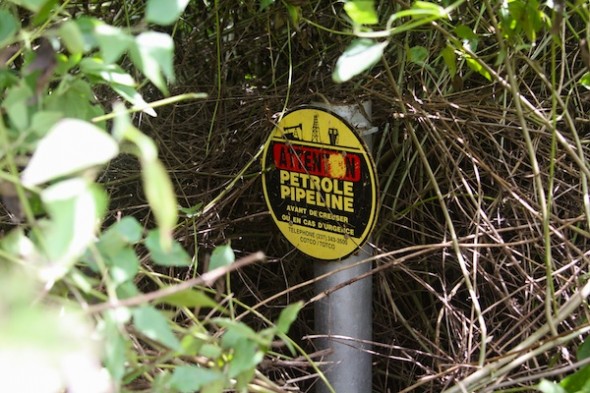
The 30 meter wide pipeline easement is supposed to be kept cleared at all times. This pipeline marker was buried under thick brush in clear violation of safety regulations. Photo by Christiane Badgley
Environmentalists in Cameroon and Chad have long been concerned about the safety of the 1070 km Chad-Cameroon oil pipeline and have stated repeatedly that COTCO (ExxonMobil pipeline operations in Cameroon) has not provided reliable information about its real capacity to respond in the event of an oil spill. Much of the pipeline crosses relatively remote and hard-to-access areas (few or no roads) and many question COTCO’s assertions that response teams could quickly travel to the scene of any incident.
Will the Chinese use the Chad-Cameroon pipeline?
I just stumbled across an interesting bit of news. China and ExxonMobil may do business together in Chad. I said, “may,” not “will,” but this could be a significant development.
It is fascinating the way information about the Chad-Cameroon pipeline is revealed. It’s really difficult to get interviews with government or oil company officials. I’ve tried off and on for months, to no avail. So for some information I watch what comes through the (state-run) press. Nothing is straightforward. Items often appear about events that occurred months earlier, for seemingly no reason, but sometimes interesting little nuggets of information are mentioned in passing.
If you’re not paying attention, they are easily overlooked. For example, a few days ago, the Cameroon Tribune (government publication) ran an article about the pipeline with the headline, “36.75 million barrels of oil and 7.6 billion Francs” (That’s about US$ 17 million.)
The article, basically highlights from the October 2010 Pipeline Steering and Monitoring Committee report, began with details on the quantity of oil that had transited across Cameroon during the first ten months of 2010, along with information on the transit fees. Apparently less oil was pumped in 2010 than in 2009. Okay. Chances are if you weren’t following the pipeline story you wouldn’t even read beyond the headline.
Yet, several paragraphs down, the article contained some intriguing information.
Kribi: Major industrial developments on the horizon
Take a nice look at Kribi’s quaint fishing port. It may be unrecognizable in a few years.
After many years of talks and delays, the Cameroonian government appears to be moving ahead with the Kribi deepwater port project, the first step of a major industrial development program.
A recent dispatch from Chinese state radio announced that the Cameroonian government will soon begin a US$50 million compensation program for residents on the site of the future port. According to the article, “The Kribi deep water port in southern Cameroon will be constructed on a 26,000 acres piece of land. It will have an industrial complex with four terminals as well as a mineral wharf for exporting iron. According to the construction timetable, the general excavation works are expected to begin in December.”
No details are provided on the nature of the compensation or the number of people who will be displaced by the project.
The port is not the only major development on the horizon. Work is already underway on Kribi’s gas thermal power plant, which is expected to become operational sometime in late 2012.
Is there a connection between the Chad-Cameroon oil pipeline and the proposed industrial development around Kribi? That depends how you define “connection.”
Gas Is Really Costing Us About $15 a Gallon

"Oil Tear," by George Osodi
Gas Is Really Costing Us About $15 a Gallon | | AlterNet.
Read this and think.
This excellent article details many of the “externalized” costs of oil production — costs that we pay through the myriad subsidies we provide to the oil companies. And one thing worth noting with this accounting: the costs of damage caused by drilling and spills in many developing countries can only be guesstimated. Standard operating procedure for oil companies working in locales far from prying journalists or vigilant authorities is to simply ignore environmental and economic damage.
Out of sight, out of mind.
Oil…A Pipeline to Prosperity?
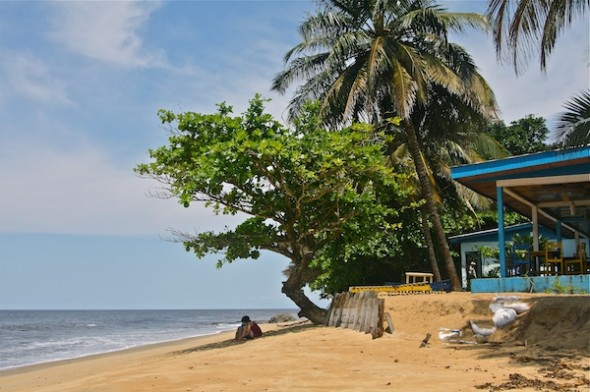
Tourists at Bume Beach, opposite the pipeline's marine loading terminal. Photo by Christiane Badgley
I have produced a short film for PBS/Frontline World to mark the 10th anniversary of World Bank engagement in the Chad-Cameroon Oil Development and Pipeline Project. Cameroon: Pipeline to Prosperity? revisits the story of the “model” oil for development project. Ten years ago the oil companies and the World Bank promised that this project would break the resource curse and prove to the world that oil could be a force for good…
What has happened? Watch the film to see how Chad’s oil has impacted life along the pipeline in Cameroon.
This work was produced with support from Frontline World, The Pulitzer Center on Crisis Reporting and The Center for Investigative Reporting.
Cameroon: Pipeline to Prosperity? is the first installment in my ongoing exploration of Africa’s booming oil industry, Pipe(line) Dreams. You can read more about the project on the website.
Please support my work on this project by viewing the film and leaving your feedback. It is crucial to show funders that this work matters!
The U.S. now imports more oil from Africa than from the Middle East, with oil accounting for more than 80% of all African imports into the country. African is soon expected to account for close to one quarter of U.S. oil consumption.
With Africa increasingly seen as the next frontier of oil exploration, there is no shortage of oil companies lining up for financing from the World Bank Group. Oil drilling has begun in Ghana with support from the World Bank Group; loans may soon be approved for Uganda. New oil has been found in Chad, Cameroon, Nigeria, Angola — even Sierra Leone. The list goes on, with government and corporate officials in each country promising to make oil work for the people.
But in countries lacking accountability, with weak legal systems and lax or nonexistent environmental regulation and enforcement, is oil really a viable development option? And is there a valid reason that public funds subsidize these projects? Both the U.S. and China depend heavily on African oil, yet we rarely see anything about how that oil dramatically transforms African communities, economies and environments. Pipe(line) Dreams, a timely and globally relevant story, will bring much needed attention to the rapidly expanding oil industry in Africa.
Nigeria’s agony dwarfs the Gulf oil spill. The US and Europe ignore it.
The Deepwater Horizon disaster caused headlines around the world, yet the people who live in the Niger delta have had to live with environmental catastrophes for decades.
John Vidal, environment editor, The Observer, Sunday 30 May 2010
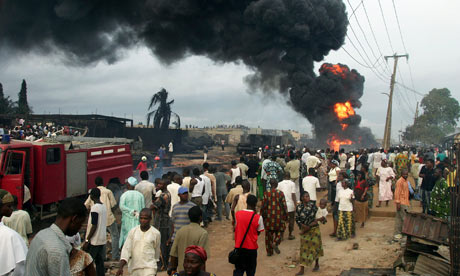
We reached the edge of the oil spill near the Nigerian village of Otuegwe after a long hike through cassava plantations. Ahead of us lay swamp. We waded into the warm tropical water and began swimming, cameras and notebooks held above our heads. We could smell the oil long before we saw it – the stench of garage forecourts and rotting vegetation hanging thickly in the air.
The farther we travelled, the more nauseous it became. Soon we were swimming in pools of light Nigerian crude, the best-quality oil in the world. One of the many hundreds of 40-year-old pipelines that crisscross the Niger delta had corroded and spewed oil for several months.
Forest and farmland were now covered in a sheen of greasy oil. Drinking wells were polluted and people were distraught. No one knew how much oil had leaked. “We lost our nets, huts and fishing pots,” said Chief Promise, village leader of Otuegwe and our guide. “This is where we fished and farmed. We have lost our forest. We told Shell of the spill within days, but they did nothing for six months.”
That was the Niger delta a few years ago, where, according to Nigerian academics, writers and environment groups, oil companies have acted with such impunity and recklessness that much of the region has been devastated by leaks.
In fact, more oil is spilled from the delta’s network of terminals, pipes, pumping stations and oil platforms every year than has been lost in the Gulf of Mexico, the site of a major ecological catastrophe caused by oil that has poured from a leak triggered by the explosion that wrecked BP‘s Deepwater Horizon rig last month.
Oil Spill near Kribi, Cameroon
A new oil spill was reported at the marine loading terminal offshore from Kribi at 1:45 am on April 22nd.
According to COTCO, the “minor spill” occurred during a violent storm. The transfer of oil from the loading terminal (FSO) to a waiting tanker was halted due to bad weather. High waves washed some “residual oil” from the deck of the waiting tanker. Again, according to COTCO, less than five barrels total were spilled and the oil was immediately cleaned up.
No oil has been reported on the coast, but fishermen did report seeing a sheen of oil offshore.
Several Cameroonian NGOs have released a statement deploring the lack of communication between COTCO and the local populations as well as the lack of any statement or information from the Cameroonian government. The Comité de Pilotage et de Suivi des Pipelines (CPSP), the Cameroonian authority responsible for the pipeline, has not made any public comments regarding the spill. With no information from the government and no journalists allowed near the marine loading terminal, it is extremely difficult to verify COTCO’s information.
In November 2009 the Cameroonian government adopted a national oil spill response plan. This plan, required by the World Bank, should have been in place before oil began to flow along the pipeline in October 2003. The Cameroonian government has not made the plan public and many civil society activists believe the plan remains non-operational. Samuel Nguiffo, from the Center for the Environment and Development, points to the unfolding disaster in the Gulf of Mexico as a warning: “It is urgent that the government increase its capacity to respond to a disaster and make the oil spill response plan operational.”
In the event of a major spill, several million barrels of oil could end up in the Atlantic ocean 12 km. off the coast of Kribi, Cameroon’s main tourist destination and an important fishing and sea turtle nesting zone. The thought of a spill anywhere is terrifying, but watching what’s going on in the Gulf of Mexico now makes me extremely uneasy about Cameroon. Of course the situation in the Gulf is particular, but one clearly sees that controlling an oil spill, even with the best equipment and ample manpower, is incredibly difficult. Any significant spill at the marine loading terminal in Kribi would likely be an ecological (and economic) disaster of major proportions.
It’s important to remember that the offshore marine loading terminal at Kribi (the FSO), is a single-hulled refurbished tanker. Today all tankers, including those used as FSOs, must be double-hulled — an additional protection against spills.
Tax Time
It’s that time of year, and ExxonMobil is getting a lot of attention. The company is number two on the Fortune 500 list this year, behind WalMart and ahead of Chevron.
ExxonMobil earned $19.3 billion in profits. That’s a significant decline from 2008 when ExxonMobil was at the top of Fortune’s list, but all in all, still pretty good.
Rex W. Tillerson, Chairman of the Board and Chief Executive Officer, earned more than $10 million in total compensation (although he ranks “only” 129th on the Forbes Executive Pay list).
ExxonMobil spent $27 million lobbying last year, outspent only by the U.S. Chamber of Commerce.
And ExxonMobil’s taxes? Well, apparently that’s complicated. ExxonMobil does pay a lot of taxes, but most of the corporation’s tax spending is overseas. According to Forbes, “Naturally, the oil giants do most of their business with high-tax oil-rich regimes. Exxon has many homes for the plentiful profits left over, with 20 wholly owned subsidiaries domiciled in the Bahamas, Bermuda and the Cayman Islands. These (legally shelter) the cash flow from operations in the likes of Angola, Azerbaijan and Abu Dhabi.”
Crude Awakening, Part two
The World Bank-supported Chad-Cameroon oil pipeline looks a lot different on the ground than it does from offices in Washington, D.C. Is the project a success? Depends who you ask!
One thing is certain: the controversy surrounding the “model” oil development project has hardly died down.
This video looks at ongoing compensation problems around Kribi, Cameroon. The Cameroonian Oil Transportation Company, COTCO (ExxonMobil), is responsible for compensating locals for lost lands and revenues.
Traveling from the fishing village of Bumé where locals have been suffering since pipeline construction crews destroyed their fishing grounds, to the Bagyeli pygmy villages in the rainforest, where the Bank-mandated, “Indigenous Peoples’ Plan”, has been stalled for years, I met one angry resident after another.
Today people are especially frustrated as they feel they have no recourse. The government is unresponsive; COTCO (ExxonMobil) is unresponsive. There’s nowhere for people to go with their complaints. It seems the world has forgotten about the Chad-Cameroon oil pipeline.
2010 A New Year
Fragile existence. This is the story of life along the pipeline. Whatever happens to the global economy, the price of the barrel or ExxonMobil’s profits in 2010, life here will remain difficult. But the oil won’t stop flowing any time soon and as long as the pipeline is operational, there are opportunities for progress.
Peoples’ voices will be heard, their stories shared. Increased awareness, increased transparency, pressure from stockholders – these are all real possibilities that can lead to change. Oxfam has been actively involved in efforts to promote transparency in the extractive industries, for example, and recently launched a “Follow the Money” campaign. The Extractive Industries Transparency Initiative is moving forward.
Of course any change on the ground will be minimal at best, but let’s all work to make 2010 a year with a bit more social and environmental justice where it’s needed most.
Chevron in the News
I don’t write much about Chevron, as ExxonMobil is the lead-operating partner on the Chad/Cameroon Development Project. But Chevron is one of the consortium members, with a 25% ownership stake in the venture.
This week’s East Bay Express features an article by Peter Asmus, The Case Against Chevron. The article describes an unprecedented campaign by nonprofit groups targeting Chevron’s global operations.
The article doesn’t mention Chad or the pipeline; activists working on the Chad/Cameroon Development Project usually focus their attention on ExxonMobil. But it’s worth reminding people that the Chad Oil Project includes three private partners: ExxonMobil, Petronas and Chevron.
I found Asmus’ article interesting as he devotes part of it to discussing if and how Chevron can become part of the solution, including what he calls, A 12 Step Program for Chevron.
A similar program could be drawn up for the Chad/Cameroon Development Project. The challenge, of course, is getting a company as powerful as ExxonMobil to hear, let alone, heed the call for change.
Missing Fish
Fishing in Kribi isn’t what it used to be. There are certainly multiple reasons for the decline in fish stock, but everyone here singles out the pipeline as the main culprit. The pipeline cuts right through the middle of the coastal village of Bume, just south of Kribi, on its way to the marine loading terminal 12 kilometers offshore. The residents of Bumé, who depend entirely on fishing, blame the pipeline for killing their livelihood.
There are two types of fishing in the Kribi area and the pipeline impacted each differently. The hardest hit are the small, village fisherman — like the residents of Bumé — who put their nets out just offshore. These fishermen do not have motor power; they paddle their small dugout canoes out to sea and are unable work more than a few kilometers from shore.
They used to catch the fish that lived in the reef just offshore. That reef was blasted away during pipeline construction and the fish have never come back. Using their traditional fishing methods, local fishermen now pull in only a few kilos of fish at a time. Sometimes, they pull in nothing at all.
As I mentioned in an earlier post, the initial pipeline plans did not include the destruction of the reef. As no one from ExxonMobil would speak to me, I could not find out why this, a significant environmental impact, was not not part of any early reviews. The shallow waters of the coast here are lined with rocky offshore reefs and the Bumé reef was clearly visible. If any local fishermen had been interviewed, they would have talked about the importance of the reef for local fishing.
C is for Corruption
This is an angry man. He’s standing in a 4 million CFCA (US$ 9000) fish pond. Well, it was supposed to be a fish pond.
When the last section of the pipeline was laid from the beach at Kribi to the offshore marine loading terminal, construction crews blasted away the reef at Bumé, the fishing village at “ground zero.” The fish left the area and for the population of Bumé, entirely dependent on fishing, this was a disaster.
The original pipeline plans did not include the reef’s destruction, so there was no mitigation plan in place when the crews came through. After much discussion, the consortium offered to construct two ponds for fish farming. Never mind that the villagers of Bumé are fisherman, not fish farmers, and that they have neither the skills nor the resources for aquaculture. These artisanal fishermen paddle out with their nets out once or twice a day, catching relatively small amounts of fish in the shallow waters. This is subsistence fishing: they bring in just enough to eat and, if all goes well, sell a few fish each day.



